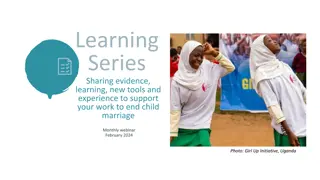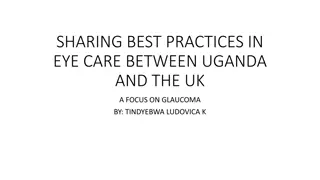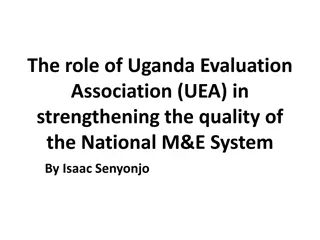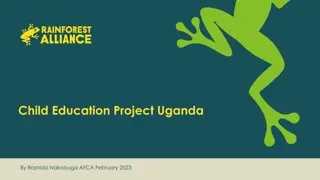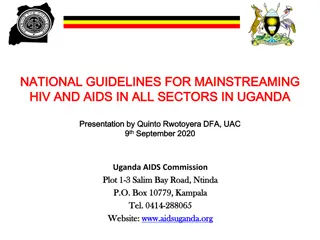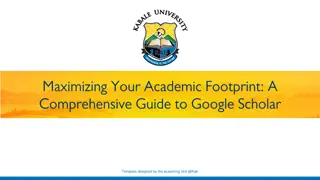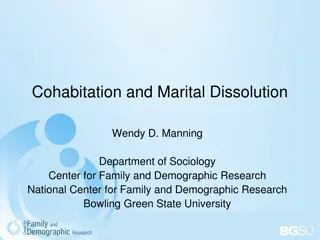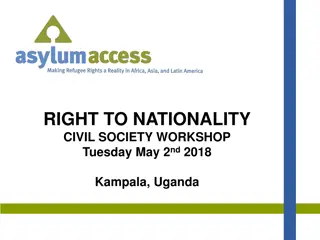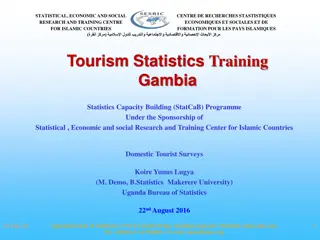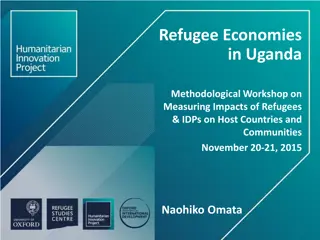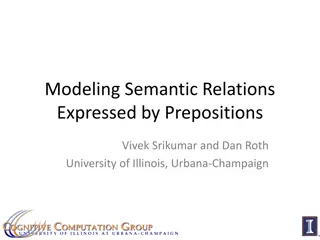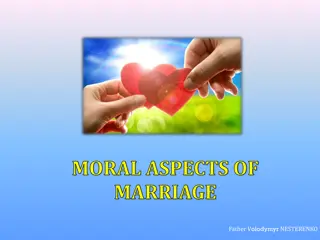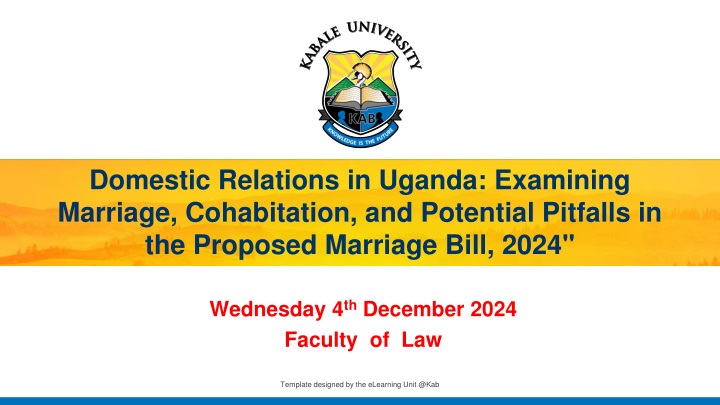
Marriage Laws in Uganda: Definitions, Rights, and Pitfalls in the Proposed Bill
Explore the legal landscape of marriage in Uganda with a focus on definitions, rights, and potential pitfalls in the proposed Marriage Bill of 2024. Delve into aspects such as breach of promise to marry, capacity to marry, types of marriage, and the applicable laws governing marriages in Uganda.
Download Presentation

Please find below an Image/Link to download the presentation.
The content on the website is provided AS IS for your information and personal use only. It may not be sold, licensed, or shared on other websites without obtaining consent from the author. If you encounter any issues during the download, it is possible that the publisher has removed the file from their server.
You are allowed to download the files provided on this website for personal or commercial use, subject to the condition that they are used lawfully. All files are the property of their respective owners.
The content on the website is provided AS IS for your information and personal use only. It may not be sold, licensed, or shared on other websites without obtaining consent from the author.
E N D
Presentation Transcript
Domestic Relations in Uganda: Examining Marriage, Cohabitation, and Potential Pitfalls in the Proposed Marriage Bill, 2024" Wednesday 4thDecember 2024 Faculty of Law Template designed by the eLearning Unit @Kab
Presenters Counsel Haawa Ruhweza Assistant Lecturer Department of Public and Comparative Law Faculty of Law Counsel Dalton Odomoch Assistant Lecturer Head of Department Public & Comp Law Faculty of Law Dr. Charlotte Kabaseke Lecturer Dean Faculty of Law Template designed by the eLearning Unit @Kab 2
Definition of Marriage. Law Applicable to Marriages in Uganda. Breach of Promise to Marry. Capacity to Marry/ Who can Marry/ get married? Places legally authorized for celebrating a marriage. Rights and Duties in Marriage. Types of Marriage in Uganda Suspension of Marital Obligations Bars to Divorce Voidable marriage ( S. 11 and 12 D.A) Legal Effects of Divorce Background to the Bill Purpose of the Bill Objectives of the Bill Significance of the Bill Contentious provisions and potential legal pitfalls in the proposed Bill Presentation Layout 3
Definition of Marriage: 1. A voluntary union for life between a man and a woman to the exclusion of all others (Hyde v Hyde [1886] LR 1 P & D 130). 2. A voluntary union for life a man and woman/women celebrated according to African Rites and customs (Customary Marriage (Registration) Act; (Alai v Uganda,Bujara V Bujara; Uganda v John Eduku, Uganda v John Kato, Namukasa v Kakondere (Divorce Cause no. 30 of 2010). 4
Law Applicable to Marriages in Uganda. 1. The Constitution of the Republic of Uganda (1995) 2. The Marriage Act Cap. 146 3. The Customary (Registration) Act Cap. Cap. 143 4. The Marriage and Divorce Mohammedans Act Cap. 147 5. The Hindu Marriage and Divorce Act, Cap. 145 6. The Divorce Act , Cap. 144 7. Uganda Registration Services Bureau Act Cap.217 8. Case Law 9. Common Law 10. Doctrines of Equity 5
Breach of Promise to Marry. 1. An action can lie against a person who breaches a promise to marry. (Widman V Walpall (1891) 2 QB 534, 2. There has to be evidence of the promise eg. letters, texts, receipts, engagement rings, witnesses, etc 3. It cannot be enforced against public policy eg. A person is incapable of making a promise (except if the existing marriage is customary and the prospective marriage is also customary or if the the promisee was unaware of the promisor`s marriage or if a decree nisi has been entered in respect to the promisor); cannot be enforceable if made by a minor or between minors 4. Promise not enforceable if the breach is not the fault of the promisor or promisee eg if one gets a chronic infection or if the promisee (a woman get pregnant for a different man) 6
Capacity to Marry/ Who can Marry/ get married? 1. Must be a man and a woman (Article 31 of the Constitution) 2. Must be 18 years of age and above (Article 31 (1)) 3. Must have consented (Article 31 (3); S. 12 (1) (e) D.A) 4. Must not be already married (except for customary marriages) (Ss. 10 (d); 32 (1) ; 39; 40; 47; 48 M.A; S. 12 D.A). 5. Must be of sound mind (Ss. 11 and 12, DA; S. 11 (C) CMRA) 6. Must not be within prohibited degrees of consanguinity or affinity (S. 10 (d); S. 10 (3) M.A; S. 11 (d) CMRA) 7
Rights and Duties in Marriage. 1. Fiction of oneness ie the woman can take on the man`s name, also spouses cannot be compelled to give evidence against each other in courts of law Article 28 (11) of the Constitution;Uganda V Kato and Others [1976] HCB 204 2. Right to Consortium / Conjugal rights ie company, confidence, support, exual intercourse, affection, privacy, companionship, etc Sec. 20, DA; Morgan V Morgan [1959] 1 All ER 539; Kemis V Ridgeway [1949] 1 All ER 66; Newton V Hardy (action for enticements); parents are exempted (Gottlieb V Gleiser [1958]); Smith V Kaye[1904]20 TLR 261. 3. Marital confidence Article 28 (11) of the Constitution; Sec. 120 of the Evidence Act, Cap. 8. Uganda V Kato and Others [1976] HCB 204 8
Rights and Duties in Marriage (Continued) 4. Matrimonial property and family property (Rwabinumi v Bahimbisomwe (Civil Appeal no. 10 of 2009) ([2013] UGSC 5). 5. Cohabitation 6. Presumption of legitimacy 7. Right to maintenance 8. Succession (Section 27 of the Succession Act; Christine Male and Another V Namanda and Another [1982] HCB 140 ) 9
Places legally authorized for celebrating a marriage. Marriage in any other place other than a license place of worship or Marriage Registrar`s office. Minister can issue a special licence to the couple to marry in any other place, in exceptional circumstances (Sec. 21 & 27, Marriage Act). Offences under the Marriage Act Bigamy, Marriage with person previously married, Making false declarations for marriage, false pretence of impediment to marriage, unlawfully performing a marriage ceremony, wilful neglect of duty to fill up or transmit certificate of marriage, personation on marriage, fictitious marriage, contracting a marriage when already married by customary law; contracting marriage by customary law when already married under this Act (Marriage Act) (Ss. 39-48). 10
Types of Marriage in Uganda (1. Civil Marriage) Governed by the Marriage Act Cap. 146. Monogamous (Ss. 10 (d); 32 (1) ; 39; 40; 47; 48 M.A) Conducted at the Marriage registry/Before the registrar of marriages (Sec. 32 (d) / CAO`s office (this function has been moved to the NIRA) Notice of marriage has to be given to the registrar of marriages who will issue a notice of marriage that lasts for 21 days (S. 9; S. 32 (2) (C) MA; One of the parties has to have been in the marriage District for at-least 15 days before the marriage celebration (to be proved by affidavit (S. 10 (1) a Should not be already married to someone else, not within prohibited degrees of consanguinity/affinity (to be proved by affidavit) (S. 10 (1) c, d; S. 10 (2) and (3). Celebrated between 10am and 4pm (Section 25) Two witnesses ( Section 26) 11
Types of Marriage in Uganda (2. Christian Marriage) Governed by the Marriage Act Cap. 146 Monogamous (s. 10 (d); 32 (1) ; 39; 40; 47; 48 M.A) Celebrated according to the different Christian sects where the parties belong (S. 19; Aboneka v Watoto Church) Celebrated in a licenced place of worship (Ss. 5; 19; 21; 32 (2) a; ) Celebrated by a licenced minister (S. 19; 32 (2) d; ) Marriage notice for 21 days (S. 32 (2) c MA; One of the parties had to be in the marriage District for 15 days before the marriage (S. 10 (a) M.A). Celebrated between 8 am and 6pm, with open doors (S. 19 (2). At least two witnesses (S. 19 (2); (24)). Marriage certificate (S. 22-24) 12
Types of Marriage in Uganda (2. Christian Marriage) Governed by the Marriage Act Cap. 146 Monogamous (s. 10 (d); 32 (1) ; 39; 40; 47; 48 M.A) Celebrated according to the different Christian sects where the parties belong (S. 19; Aboneka v Watoto Church) Celebrated in a licenced place of worship (Ss. 5; 19; 21; 32 (2) a; ) Celebrated by a licenced minister (S. 19; 32 (2) d; ) Marriage notice for 21 days (S. 32 (2) c MA; One of the parties had to be in the marriage District for 15 days before the marriage (S. 10 (a) M.A). Celebrated between 8 am and 6pm, with open doors (S. 19 (2). At least two witnesses (S. 19 (2); (24)). Marriage certificate (S. 22-24) 13
Types of Marriage in Uganda (3. Mohammedan/ Islamic marriage) Governed by the Marriage and Divorce of Mohammedans Act Cap. 147 Parties must be 18 years and above Must be between a man and a woman Consent of both parties in key (Ayiko v Lekuru (Divorce Cause no. 0001 of 2015) [2017] UGHCFD ]). Parties should not be married under civil marriage or customary marriage to different persons (S. 2; S. 13 CMRA) Polygamous in nature (Koran at Surat Nissa 4: 3) Both parties shall Marriage between two persons who profess the Mohammedan/ Islamic faith (Ss. 2, 3) Celebrated according to the Mohammedan religion and rites (S. 3) ((Ayiko v Lekuru (Divorce Cause no. 0001 of 2015) [2017] UGHCFD ]) Marriage and Divorce to be registered (S. 6) Divorce According Mohammedan Law and rites and according to the respective Islamic sects (Ss. 3, 6 &19) Marriage can be transformed to a civil/ monogamous marriage (Ayiko v Lekuru (Divorce Cause no. 0001 of 2015) [2017] UGHCFD ]) 14
Types of Marriage in Uganda (4. Customary Marriage) Governed by the The Customary (Registration) Act Cap. Cap. 143 Parties should be 18 years of age and above Parties should not already be married under civil or Islamic marriage, to different persons (S. 11 (e) and S. 12 CMRA); Celebrated in accordance with the traditional customary practices/rites of the parties in any part of Uganda (Ss.1 & 4 (1)). Girl`s tradition to be followed (Kintu v Kintu). Potentially polygamous (S. 4 (2)). Should be registered within 6 months (Ss. 6; 20) but non- registration does not invalidate the marriage marriage ( Negulu v Serugga Civil appeal no. 103 of 2013; Bujara v Bujara (Civil Appeal 81/2002 (2001-2005) HCB Vol. 3 62-63). 15
Types of Marriage in Uganda (5. Hindu Marriage) Governed by the Hindu Marriage and Divorce Act Cap. 145 Both parties should profess the Hindu Religion (S. 1 of the HMDA) Parties should be 18 years of age or older Should be already married to different persons (S. 2 (1) a; S.6; S. 8 (2) b; S. 8 (3) b ). Should be of sound mind (S. 2 (1) b Should not within prohibited degrees of consanguinity except if custom permits it (S. 2(1)e; S. 2 (2); S.8 (3) a) Parties to have consented (S. 8 (3) c). Parties can divorce in accordance with the Divorce Act or in accordance with S. 8 (2) pf the HMDA of the parties 16
Suspension of Marital Obligations 1. Separation Separation Agreement (In accordance with the agreement of the parties) Judicial Separation (Section 14 D.A) Grounds for judicial separation include Adultery, Cruelty or Desertion) 17
Suspension of Marital Obligations (Continue) 1. Dissolution of Marriage Death Divorce Grounds for Divorce (S. 4 DA) Adultery Cruelty Desertion Rape, Sodomy or Bestiality Change of religion Bigamy 18
Bars to Divorce Absolute bars (Sections 6,7,8,9 and 32 D.A) Condonation Connivance Collusion Discretionary (S. 8 DA) Satisfaction of Court Karokora v Karokora 19
Voidable marriage ( S. 11 and 12 D.A) Marriage is valid for all intents and purposes until it is declared null and void by a competent court A marriage can be declared null and void by court, if the following factors are proved: If a man is impotent If consent is obtained by fraud If a party is a lunatic Discovery that parties are within prohibited degrees of consanguinity and affinity Non Consummation (D-E V A-G (1845) 1 Robb Eccl. 274 at 278 or (1845) 163 ER 1039) Hiding vital information 20
Legal effects of Divorce 1. The parties are single and can re marry (S. 38 DA) 2. Custody and Maintenance of children in determined (S. 28 DA) 3. Alimony/Maintenance is determined (S. 23, 24, 25 DA). 4. Property Division (S. 26 and 27 DA) 5. Damages eg. If divorce ground was adultery (S. 21 DA) 6. Costs (S. 22 DA) 21
Background to the Bill Informed by outcome of studies on: Marriage and dissolution of marriage in Uganda Report of the Commission of Inquiry into Marriage, Divorce and Status of Women (Kalema Report) 1965, The FIDA -U Report on draft Domestic Relations Bill, 1980, the Marriage and Divorce Bill 2009, and the Ministry of Women in Development, Culture & Youth Report on the draft 1980 Domestic Relations Bill, (W.I.D Working paper and Tororo Report) 1993, Reports of numerous consultations undertaken overtime from various stakeholders 22
Defects in the Law on Marriage Courts have declared various provisions in existing legislation unconstitutional including sections of the Marriage Act under which the recognized age of marriage is twenty-one years, the superiority of civil marriage over customary marriage and the variation in grounds for divorce between men and women under the Divorce Act. Courts have further outlawed various practices against- Equality and nondiscrimination against women. The Supreme Court in Mifumi (U) Ltd &. Anor v Attorney General & Anor (Constitutional Appeal No. 2 of 2014) [20151 UGSC l3 (6 August 2015) declared as unconstitutional the demand for the refund of bride price as it undermines dignity of women and violates right of women to equality with men during and after dissolution of marriage and undermines wife s unique and valuable contribution during marriage, undermines Uganda s obligations and commitments under various international instruments like CEDAW. 23
Defects in the Law on Marriage (Continued) Question of Matrimonial Property rights upon dissolution of marriage: That the court in Ambayo v Aserua (2022) UGCA 272 determined that a spouse is entitled to a share of the matrimonial pty upon dissolution of marriage if it can be proved that the spouse made a contribution towards the acquisition of the pty. 50/50 percent formula rejected. 24
Other issues the Bill seeks to address Other issues the Bill seeks to address That presently, the license regime is discriminatory because it requires permanent church to be licensed for Christian marriages but not the same for other forms of marriage. That that courts have clarified in many cases including Ambayo v Aserua, Peace Uhirirwe vs Paul Kaggwa, Julius Rwabinumi vs Hope Bahimbisomwe that Marriage is not an entitlement to a fifty percent interest in matrimonial property. 25 25
Some of the Key Objects of the Bill Some of the Key Objects of the Bill The Bill proposes several reforms: Including equal rights to property for spouses, regardless of their financial contribution. i. Criminalizing child marriages, and ii. iii. Setting a timeline (06 months) for consummating marriages, with the risk of them being declared void if not fulfilled. 26 26
Key Provisions Key Provisions Six(06)-month ultimatum for consummating marriages ( Clause 41(1),) the Bill states that a marriage may be declared void if a spouse is either unable or willfully refuses to consummate the marriage within six months of the wedding. Consummation of a marriage is the first sexual act between a married couple (per Canon law) Additionally, the concealment of any material fact that would affect the other party s consent to the marriage could also render the union voidable- means something can be voided or made void, or is capable of being nullified or invalidated. In law, it means a transaction or action is valid but can be annulled by one of the parties involved 27
Key Provisions and Proposals in Bill continued Key Provisions and Proposals in Bill continued A three (03)-year jail term or a fine of UGX 10 million or both for individuals who demand the return of marriage gifts after the union/ marriage has dissolved. (Clause 87(2)) Clause 87 (1)of the Bill clearly prescribes the act of requesting the return of gifts during union or after unions as a criminal offense. Additionally, court may award damages to an aggrieved party where demand of return of marriage of gifts is made (Clause 87 (3) of Bill) Jactitation of marriage: A person who falsely claims or asserts that he or she is married to a particular Person commits an offence known as jactitation of marriage and is liable on conviction to a fine not exceeding 10M or imprisonment not exceeding three years or both. 28
Key Provisions and Proposals in Bill continued Key Provisions and Proposals in Bill continued Criminalization of Holding out as though married/ Co-habitation- Clause 89 A person who holds out as a husband or wife commits an offence and is liable on conviction to a fine not exceeding 10M shs or imprisonment not exceeding three years or both. Holding out under this part means living together as husband and wife, acquiring or owing property jointly, bearing children together, and taking on the man's surname by the woman. Breach of Promise to marry- clause 90 A person who breaches a promise to marry is on conviction, Liable to pay damages for the breach. .(clause 90(1)) Promise to marry means a contract (implied from conduct or express;) mutually entered into by a man and a woman capable of contracting marriage that they will at a promised time marry each other, and premised on which, either party based his or her actions or omissions towards the other party.(clause 90(6)) 29
Key Provisions and Proposals in Bill continued Key Provisions and Proposals in Bill continued No award shall be granted for specific performance of a promise to marry. (clause 90 (4)) Return of a gift given in contemplation of promise to marry. (clause 90(2)) Damages awarded shall not be in excess of the actual loss suffered as a result of expenses incurred. (clause 90 (3)) Limitation period for action against breach of promise to marry- within 1 year after the date of knowledge of breach of promise to marry. (clause 90 (4)) Making false statements A person, who knowingly, or negligently makes a false oral or written statement, for purposes of fulfilling a requirement under this Act., commits an offence and is liable, on conviction, to a fine not exceeding 10M shs or imprisonment not exceeding five years or both. (clause 91) 30
Key Provisions and Proposals in Bill continued Key Provisions and Proposals in Bill continued Bigamy- Contracting marriage with married person in a subsisting monogamous marriage such as civil or church marriage is an offence- liable on conviction to pay 10M shs fine or 5 years imprisonment or both. (Clause 92) Making a false declaration for marriage is an offence- certificate, document, license, declaration or statement- 10M shs fine or 5 year jail time or both (clause 93) False pretense to impede marriage or impede celebration of marriage (eg claiming that his or her consent or anor person s consent is needed for marriage) is an offence- 10M or 5 years imprisonment or both per clause 94. Unlawful performance of a marriage ceremony when not authorized or license is an offence- 2,400,000 shs or 3 years imprisonment or both. 31
Key Provisions and Proposals in Bill continued Key Provisions and Proposals in Bill continued Right of women to retain their maiden names upon marriage- clause 43. Women barred from continuing to use their husband s surname after a divorce unless both parties mutually agree- clause 43(3) Equal Rights to consortium during subsistence of marriage- clause 43(1). Consortium is a legal term that refers to the non-monetary benefits of a marriage, including the right to a spouse's companionship, affection, and sexual relations. It can also refer to the right of a parent or child to the company, affection, and assistance of the other. Equal access to marital property: Both spouses shall have the right to use, occupy, benefit from, and dispose of property, unless agreed otherwise- Clause 49. Debts incurred before the marriage remain the sole responsibility of the individual who incurred them. However, if the property becomes matrimonial, the spouses may share liability (Clause 51) 32
Key Provisions and Proposals in Bill continued Key Provisions and Proposals in Bill continued Criminalization of child marriages (Clause 101) 10-year jail sentence for anyone who organizes, conducts, or witnesses a marriage involving a minor or marries someone below the age of 18. Establishment of a National Marriage Register, a database containing information about all married persons in Uganda. This registry would be accessible to the public upon payment of a fee to the government. (Clause 36 &37) Nature/Types of Marriage shall include: Civil marriage, Christian marriage, Customary marriage, Hindu marriage, Bahai marriage and Islamic marriage (Clauses: 4,5,6,7,8 &9) 33
Key Provisions and Proposals in Bill continued Key Provisions and Proposals in Bill continued Requirement of Consent of parties entering or contracting a marriage and premarital counseling (Clause 15). Legal scholars argue this offends the freedom and liberty of adults to marry enshrined in Article 31 of 1995 Constn (as amended) Requirement that any person contracting a marriage must be physically present- Clause 16 (Bars the habit of using portrait photos of parties as is the tendency in some cases during kwanjulas and kukyalas) Subject to act and subject to designation by Min for Justice, Marriage conductible in High Commissions, Embassies and Consulates of Uganda- (Clause 21). Certificate of No Impediment must be obtained and one of parties must be Ugandan citizen and must be an adult and of sound mind. 34
Key Provisions and Proposals in Bill continued Key Provisions and Proposals in Bill continued Prohibition of same sex marriage (clause 28) Prohibition of marriage within the prohibited degrees of relationship (clause 28) District registrars of Marriage- CAO (clause 31) Registrars of marriage celebrant in the place of worship, sub county chiefs, town clerk, local spiritual assembly of Bahai faith, Imam, Hindu priest, district registrar, or any other person designated by the minister and designated role can be delegated to any other local person. (clause 32) Conversion of marriage to any other form where permissible (clause 39) 35
Conclusion Conclusion Hon Sarah Opendi Achieng is not the first legislator to table reforms of Uganda s marriage laws. In 2009, the Marriage and Divorce Bill was introduced, aiming to modernize marriage laws. However, it was met with fierce opposition due to controversial provisions such as criminalizing marital rape and the inclusion of the term divorce, which religious leaders believed encouraged separation. Prior to that, the Domestic Relations Bill of 2003 also failed due to objections from the Muslim community over proposals to ban polygamy. Remains to be seen whether this largely progressive Bill will not turn out to be miscarriage or false starter as other similarly contentious bills have been. 36
Thank you | | Thank you | |Apwoyo Apwoyo| Asante | Mwebare | | Asante | Mwebare | Questions? Thoughts? Suggestions? 37 37 Template by the eLearning Unit @Kab

